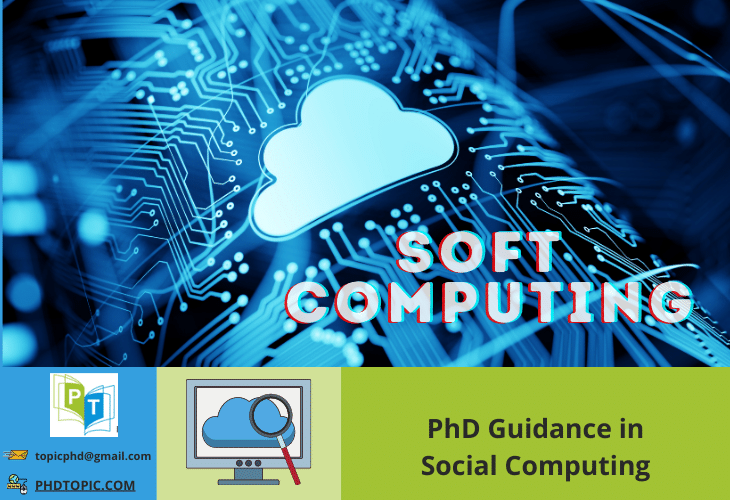PhD Guidance in Soft Computing
PhD Guidance in Soft Computing is a firm that given solutions for all your problems. Our well-learned and knowledgeable experts guide you properly, and our way of approaching is more enthusiastic that makes the researchers more satisfied. Soft computing is also a technology that offers system solutions using soft computing techniques. It encourages hybrid soft computing techniques and software tools to develop advanced applications. Soft computing fusion of research in neural net systems, fuzzy set theory, fuzzy systems, chaos theory, chaotic systems, evolutionary algorithms, genetic programming and also neural science.
We prepared a research paper and a thesis by linking the above-mentioned ideas and techniques to present with unique. As a result, the paper is published in top journals indexed in Science Citation Index, SCOPUS, Google Scholar, ACM Digital Library, and also Academic OneFile, etc.
 Hidden facts and confusing are often leaded to beautiful destinations……….
Hidden facts and confusing are often leaded to beautiful destinations……….
Advanced Concepts in Soft-Computing
- Neural networks and fuzzy systems
- Probabilistic reasoning
- Evolutionary computing
- Software and also mobile agents
- Morphic computing
- E-commerce and e-medicine
- Rough Sets and also wavelet decomposition
- Pattern and also vision recognition
- Nano and also micro systems
- Reactive Distributed AI
- Symbolic machine learning
Guidance in Soft Computing
PhD Guidance in Soft Computing creates your identity by our imagination. Making you a researcher is our duty, and we responsible for every scholar of the globe to enhance their academia. Our guidance in soft computing is served to reach your dream destination since its ten years of formation. As we also grow in a vibrant mode with lots of richly enriched and updated ideas to offer heritage and also fascinating research. A well-prepared thesis, acceptable journal papers, conference papers in soft computing projects is our research works that are well prepared also for our committed students.
Let us now commit with your research……….
Soft-Computing Research Areas
- Multiple sensor networks
- Cloud computing
- Big data
- Tele communications
- Biomedical engineering
- Signal processing
- Data mining
- Image processing
- Web applications
Advanced Techniques in Soft-Computing
- Decision support systems and also online fault detection
- Online media stream classification
- High throughput production systems modeling
- Data stream identification and also modeling
- Condition monitoring and also process control
- Adaptive chemo metric models also in dynamic chemical processes
- User activities recognition
- Power systems soft computing applications
- Intelligent transport, robotics and also advanced manufacturing
- Adaptive evolving controller design
- Intelligent computing also in computational biology
- Intelligent computing also in drug design
- Haplotype analysis and SNPs
- Proteomics computation
- Genomics computation
- Stock market forecasting and also online time series analysis
Development of Tools and Software’s
- Peltarion Synapse
- KEEL
- Matlab
- TensorFlow
- HUGIN
- SECABA2
- Microsoft Azure
- RSNNS
- Apache Mahout
- SCIMAT
- RapidMiner
- Keras
- Mathematica
- XGBoost
- Stat4tox
- Aptana
- SageMath
Purpose of Tools and Software’s
- Peltarion Synapse: Free and open source based advanced development environment (component based) that also used for adaptive systems and neural networks
- KEEL: Open source java software tool that can be also used for enormous knowledge extraction
- Matlab: 4th generation programming language also for numerical computation.
- TensorFlow: Open source software library used also in data flow graphs for numerical computation
- HUGIN: Open source software to provides knowledge also for some specific decision problems using Bayesian networks
- SECABA2: Web application to capture library user opinion by LiBQUAL+TM model that developed in SECADA laboratory (quality evaluation and also information retrieval lab)
- Microsoft Azure: Innovative technology to supports many programming languages, frameworks and also tools to provides cloud services (SaaS and IaaS)
- RSNNS: R programming based neural network simulator based on SNNS (Stuttgart Neural Network Simulator)
- Apache Mahout: Free software to develop scalable and also distributed machine learning algorithms
- SCIMAT: Open source software tool licensed under GPLv3 which works under longitudinal framework to allows science mapping analysis.
- RapidMiner: Data mining software that also used to process validation, visualization and optimization
- Keras: Python based API that used for high level neural networks and also its running on either top of Theano or TensorFlow.
- Mathematica: Computational program that used to computes symbolic representation.
- XGBoost: Expansion of XGBoost is “Extreme Gradient Boosting” started to implement machine learning algorithms with more flexible and portable in R, JVM, Python, CLI, Knobs, and also Julia etc.
- Stat4tox: Open source computer program that also used to develop a wide range of statistical analysis techniques also for Toxicological data.
- Aptana: World’s leading Open Source IDE also for web development
- SageMath: Open and free source software system (licensed in GPL) and also software to covers various aspects mathematics.
Major Research Topics in Soft-Computing
- Artificial neural networks
- Approximate reasoning
- Biomedicine and also bioinformatics
- Bayesian network
- Big data
- Control systems
- Cloud computing
- Data mining
- Fuzzy logic
- Functional approximation
- Evolutionary programming
- Genetic algorithms
- Hybrid models
- High dimensional space generalization
- Neuro Fuzzy System
- Non-linear separation
- Optimization problem
- Machine learning also for optimization problems
- Randomized Search
- Swarm intelligence and also meta heuristics
- Sustainable development
